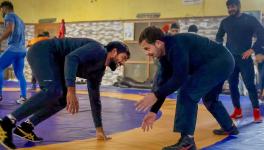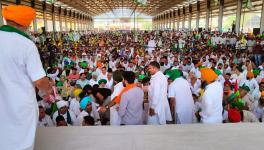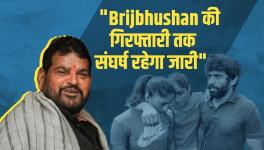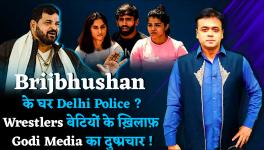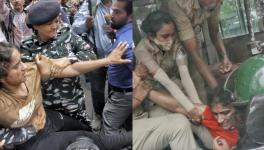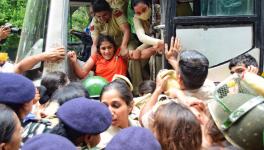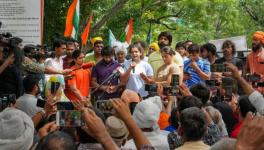Tokyo Olympics: Ravi Dahiya Shows Technique and Composure, Puts Indian Wrestling Among the Medals
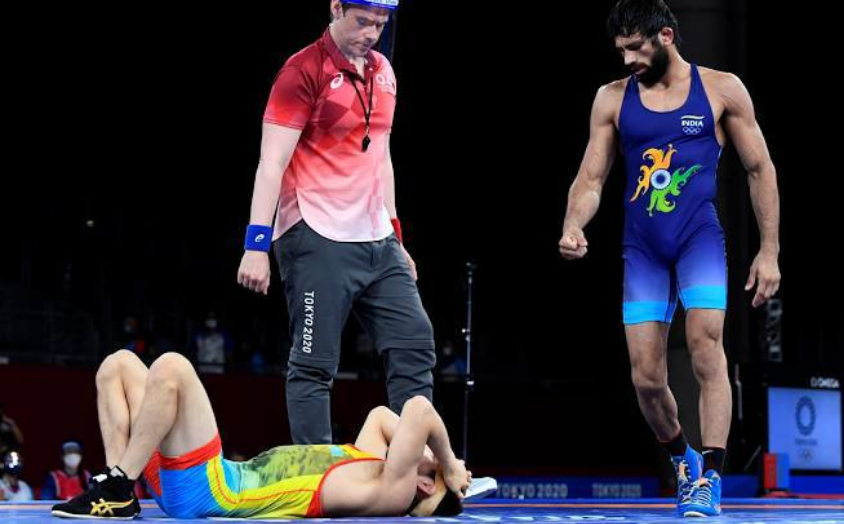
Ravi Dahiya pinned down Nurislam Sanayev of Kazakhstan in their men’s 57kg freestyle semifinal match at the Tokyo Olympics on Wednesday (Pic: UWW, Twitter).
The generational shift in Indian wrestling is complete. New stars are emerging at this edition of the Olympic Games but some things — happy ones thankfully — remain the same. Ravi Kumar Dahiya entered the final of the 57kg freestyle category at the Tokyo Olympics, while Deepak Punia is set for the bronze medal wrestle-off in the 86kg division. And Anshu Malik will fight the repechage rounds in the women’s 57kg category.
Ravi sealed India’s first medal on the Tokyo Olympics mat — silver assured — while through the day’s action, we had reminders from the days of the wrestlers who first planted the flag at the Games 13 years back.
There are a few wrestling terminologies which Indians, those outside the fraternity and the larger fandom of grappling, have become very familiar with. These additions to the lexicon, came as happy corollaries to the success of Sushil Kumar, Yogeshwar Dutt and Sakshi Malik at the Olympic Games. Repechage, the french term, which is used to denote the bracket for wrestlers who fight for bronze, is one. The phittle, or the ankle lace, is another. The two terms keep repeating in Indian wrestling lores, and are thrown about by chroniclers every four years, when the sport receives attention from India outside of the hinterland, its hotbed.
Also Read | Tokyo Olympics: Lovlina Borgohain Settles for Bronze, But Not Before an Epic Fight Against Odds
On Wednesday, those two terms resurfaced in the Indian Olympic consciousness again, with Anshu in the rounds, and Deepak at the business end of the repechage bracket to fight for bronze. However, the other term, the name of the almost unstoppable par terre technique which became folklore thanks to Yogeshwar’s liberal use of it to win his bronze in London, gave a mini scare. It almost cost India’s Ravi a place in the final.
It is hard to predict wrestling based on ranking or seeding. Much like what we have seen in events like archery and boxing, wrestling’s ranking is a good measure of quality, but not an exact parameter to judge credentials for a medal at the Olympic Games. So, Ravi is seeded, but going into the bout against Nurislam Sanayev of Kazakhstan, there were no clear favourites.
The only edge Ravi had was that he was relatively fresh, having dominated his opening two bouts (vs Oscar Tigreros of Colombia and Georgi Vangelov of Bulgaria). Sanayev had come through brutal bouts, including a cliffhanger against local favourite and former world champion Yujiro Takahashi of Japan. He also had a cut on the forehead.
Also Read | Hurdling to Greatness: Karsten Warholm Frees an Event From the Matrix
If there was fatigue or injury at play, it was not evident in the opening period of the bout with Sanayev opening scoring via a penalty point. Referee had deemed Ravi to be passive. A subjective point in wrestling, the penalty for passivity is at times unfair, for more often than not, it does not mean the wrestler is fleeing a hold. Ravi was measuring up his opponent at the time, and moved his side of the scoreboard soon with a side flip, a reactive counter when Sanayev dived to his leg.
The bout progressed on expected lines into the second period — a tight contest — till Sanayev scored from a takedown and then, in one motion, locked Ravi’s ankle in the dreaded phittle lock. He flipped Ravi thrice, earning six points on the trot. The score read 9-2 at that point, and it seemed the bout was as good as over.
But a different narrative was destined, with Ravi showing signs of not panicking, and instead, working on getting the inside hold to shoot at the opponents legs for his throws.
Takedown one. 9-5. The double-leg dump to the safety area of the mat, seemed to injure Sanayev, who took timeout. A little over one minute was left in the match. Ravi was restless. He knew he had the momentum and was keen to get on with it.
Takedown two. 9-7. The keenness in body language and intent was beautifully translated to action when Ravi took the Kazakh wrestler down again, and locked him up for a pin fall. A memorable victory, and one that shows the real character of Ravi, the wrestler. Nonchalant aggression, a rarity in the power sport and only seen among some of the greats. The comeback also retained India’s tryst with the phittle on happy terms. A positive word association so to speak.
Also Read | The Tokyo High: Indian Women’s Hockey on Cusp of a Revolution That Needs Nurturing
Ravi has a bigger challenge in front of him now — the best wrestler of his division, Zaur Uguev of Russian Olympic Committee (ROC) awaits him in the final. The Indian, despite his run in global tournaments, has certain weaknesses that could be exposed by the Russian, including a physical tell he inadvertently displays before his takedown action down the left side. Ravi leans a wee bit forward, and reaches for the leg before diving in. His fitness and flexibility are used amply to push his will in takedowns but this is something an experienced wrestler could negate. And Uguev is one. However, Ravi’s X-factor, his reactive versatility — the way he did the side slip out of the blue in the semis — will give him a say in the bout too.
Deepak, on the other hand, despite his second seeding, cannot exactly be considered the world’s best. That tag belongs to Iran’s Hassan Yazdani Charati, Artur Naifonov of ROC, and David Taylor of the US. The American outclassed Deepak in the opening period of their semifinal, scoring 10 points at will to enter the final against the Iranian legend.
Deepak awaits his bronze playoff opponent, to be decided on Thursday in the repechage bracket. Two prominent wrestlers had lost to Taylor in the preliminary round — Ali Shabanau of Belarus and Miles Amine of San Marino, who trains in the US. Both these wrestlers are formidable in their own right, just that they came in the way of Taylor, one of the best in the era.
Click | For More Coverage of the Tokyo Olympics From Newsclick Sports
So the Indian would have a tough proposition, and the hope is that he will be able to use his strength, and the sudden burst of speed he employs for takedowns, to overcome the opponent and secure another medal for India.
Anshu Malik, the third wrestler who featured in the day for India, lost in the opening round. Her nemesis, Irina Kurachkina of Belarus, entered the final, giving Anshu a second chance at glory. The repechage will happen on Thursday, August 5, followed by the medal rounds.
And, hopefully, India’s happy association with the wrestling terms will continue. Maybe, more would be added over the course of the campaign which will see Vinesh Phogat and Bajrang Punia — both medal prospects — compete in the coming days (Vinesh on August 5 and Bajrang on August 6).
Get the latest reports & analysis with people's perspective on Protests, movements & deep analytical videos, discussions of the current affairs in your Telegram app. Subscribe to NewsClick's Telegram channel & get Real-Time updates on stories, as they get published on our website.









